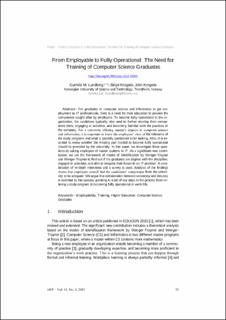| dc.contributor.author | Lundberg, Gunhild Marie | |
| dc.contributor.author | Krogstie, Birgit Rognebakke | |
| dc.contributor.author | Krogstie, John | |
| dc.date.accessioned | 2022-02-28T10:15:01Z | |
| dc.date.available | 2022-02-28T10:15:01Z | |
| dc.date.created | 2021-12-02T15:00:56Z | |
| dc.date.issued | 2021 | |
| dc.identifier.citation | International Journal of Engineering Pedagogy (iJEP). 2021, 11 (3), 21-38. | en_US |
| dc.identifier.issn | 2192-4880 | |
| dc.identifier.uri | https://hdl.handle.net/11250/2981641 | |
| dc.description.abstract | For graduates in computer science and informatics to get employment as IT professionals, there is a need for their education to provide the competence sought after by employers being aligned with the discipline. To become fully operational in the organization, the candidates typically also need to further develop their competence there, engaging in activities, and becoming familiar with the practices in the company. For a university offering master’s degrees in computer science and informatics, it is important to know the employers’ view of the relevance of the study programs and what is possibly considered to be lacking. Also, it is essential to know whether the missing part needed to become fully operational should be provided by the university. In this paper, we investigate these questions by asking employers of master students in IT. We use the framework of modes of identification by Wenger-Trayner and Wenger-Trayner to find out if the graduates are aligned with the discipline, engaged in activities, and able to imagine their future in an IT-position. A combination of in-depth interviews and a survey is used. Analysis of the findings shows that employers overall find the candidates’ competence from the university to be adequate. We argue that collaboration between university and industry is essential to this success, pointing to a set of key steps in the process from entering a study program to becoming fully operational in work life. | en_US |
| dc.language.iso | eng | en_US |
| dc.publisher | International Association of Online Engineering (IAOE) | en_US |
| dc.rights | Navngivelse 4.0 Internasjonal | * |
| dc.rights.uri | http://creativecommons.org/licenses/by/4.0/deed.no | * |
| dc.title | From employable to fully operational: The need for training of computer science graduates | en_US |
| dc.type | Peer reviewed | en_US |
| dc.type | Journal article | en_US |
| dc.description.version | publishedVersion | en_US |
| dc.source.pagenumber | 21-38 | en_US |
| dc.source.volume | 11 | en_US |
| dc.source.journal | International Journal of Engineering Pedagogy (iJEP) | en_US |
| dc.source.issue | 3 | en_US |
| dc.identifier.doi | 10.3991/IJEP.V11I3.19995 | |
| dc.identifier.cristin | 1963588 | |
| cristin.ispublished | true | |
| cristin.fulltext | original | |
| cristin.qualitycode | 1 | |

